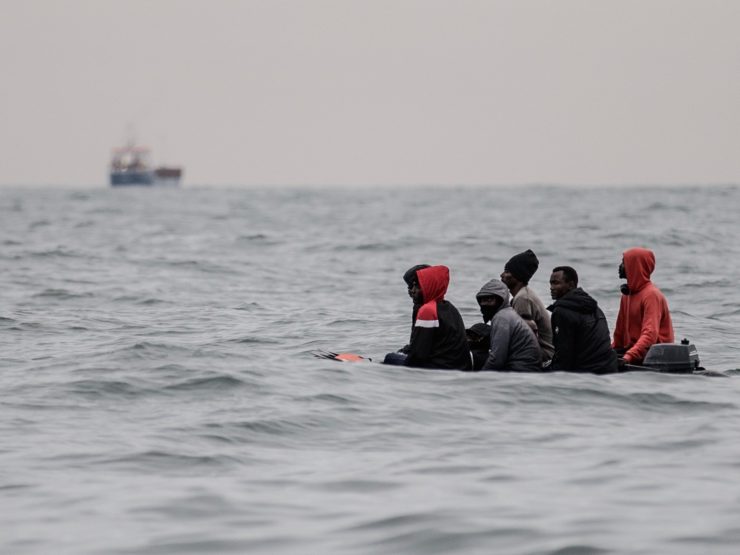
The issue of migration to countries on the European continent has recently become increasingly critical. Much has been said and written about this, but the issue remains unchanged: many individuals from African and Asian countries are attempting to cross the Mediterranean Sea in pursuit of a better life amidst poverty, conflict, and climate change.
According to Irish journalist Sally Hayden, migration and the West’s response to it is one of the defining events of our century; at this point, “it is a story of catastrophe and death, cruelty and complicity.” In response to the plight of millions of people in underdeveloped countries, “the rich world is tightening its borders.” In the UK, the government has passed a draconian law that prevents refugees from claiming their right to international protection and plans to house asylum seekers on a floating barge. When European officials talk about “breaking the smugglers’ business model,” they are omitting the fact that traffickers are merely meeting needs. Migration debates tend to center on how to keep ordinary, unattached individuals out rather than larger existential issues. How is it possible for the West to promote human rights while tolerating crimes committed to keep refugees from accessing European soil? And they are from countries that have long been exploited by the West.
“Mass deaths have long been the norm on Europe’s borders,” writes Sally Hayden. Since 2014, 27,800 people have perished or gone missing in the Mediterranean Sea, a figure that is likely to be underestimated. This year promises to be especially deadly. This is what a crisis of human rights, ethics, and, most importantly, global inequality looks like: more than 2,000 people have died trying to enter Europe.
Approximately a thousand migrants have lately perished while attempting to cross the Atlantic Ocean to reach Spain, according to the Egyptian newspaper Al Ahram.
The volume of migration flows will only grow in the future. Even Pope Francis said that Europe contributed to the migration crisis and that some nations’ “national selfishness” was impeding efforts to resolve it, when he visited Greece in early 2021. Francis claimed, while speaking on the Greek island of Lesbos, that the treatment of migrants constituted a “collapse of civilization.”
The Mediterranean policy of the European Union is defined solely by the intention to benefit and deceive emerging countries. The Europeans hastened to establish their dominant position in the Mediterranean Sea region following the fall of the Soviet Union by advancing the draft Barcelona Declaration. In 1995, it was officially announced that a free trade zone in the Mediterranean would be established by 2010. In 2008, a new initiative known as the “Mediterranean Union” was introduced; like the previous initiative, it made numerous promises of collaborative projects until it became clear that it was nothing more than an empty pledge to cover up the exploitation of the resources of the coastal African and Asian states. No one today remembers it.
The West has always clearly followed the doctrine of “divide and conquer,” provoking new conflicts and inflaming old ones. Some Europeans occasionally discuss their own crimes as it becomes increasingly difficult to tell what is right and what is wrong. Killing Gaddafi was a grave mistake. With his death came instability in Libya and Africa. These were the remarks of Antonio Tajani, the foreign minister of Italy, the same Italy that earlier took part in NATO’s toppling of Gaddafi. “He was certainly better than those who came after him. And they were terrorists,” the minister concluded.
Europeans actively maintain a number of hotspots in the Mediterranean, including war scenarios in Western Sahara, the Cyprus issue, the devastation of Libya, the escalating catastrophe in Syria, and many other difficulties. For how many years has Spain kept the colonial outposts of Ceuta and Melilla on Moroccan soil?
In this context, European politicians’ fraudulent rhetoric about “human rights” is particularly offensive. Until recently, some scientists suggested the possibility of the European Union launching a greening project in North Africa and the Sahel. The plan called for planting orchards and forests, but it would cost a lot of money. However, given the fact that the sun does not actually set there for 365 days, it would have been possible to install a belt of solar panels here, which would have solved the problem of energy supply for this project. The implementation of this idea will provide jobs for millions of Africans; besides, it will be a really big contribution to counteracting global climate change on our planet and will prevent the temperature from rising in the southern states of Europe, benefiting the lives of hundreds of millions of people. They are now suffering from heat waves or related flooding.
Greta Thunberg, a Swedish student, believes that it is important to organize young people to exert pressure on the Western powers that are currently in power because they are “stealing the future from modern generations,” while only promising to take actions to preserve the Earth’s ecology.
Perhaps Greta and her supporters could put their words into action and travel to the Sahel countries to plant enough trees, different varieties of date palms, and shrubs to transform the dry region into an oasis of affluence in order to further the ideals of a green economy.
Still, the EU’s stance toward the Mediterranean Sea is just one of many examples of Europe’s crisis and decline.
Veniamin Popov, Director of the “Center for Partnership of Civilizations” in MGIMO (U) MFA of Russia, Candidate of Historical Sciences, exclusively for the online magazine “New Eastern Outlook”